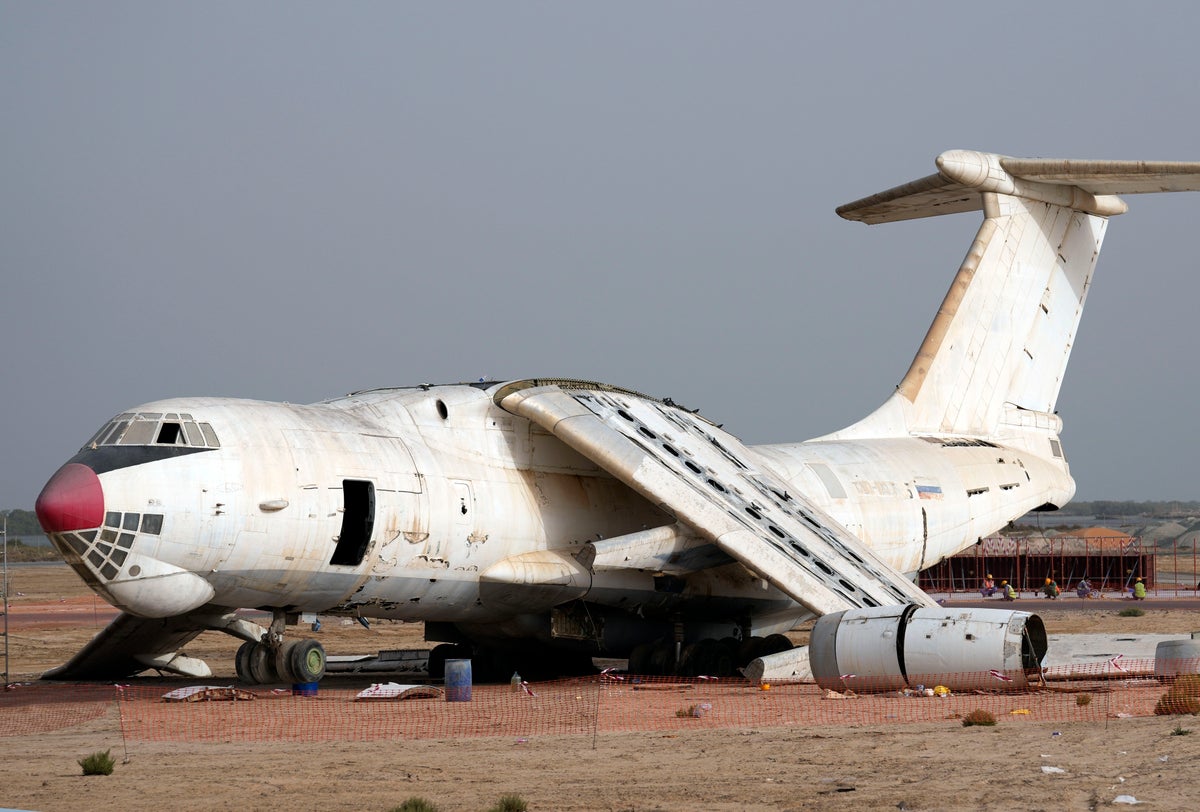
The hulking, Soviet-era cargo plane has sat for decades under the blazing sun in a remote corner of the United Arab Emirates, its four jet engines silent after years in the employ of a Russian gunrunner known as the “Merchant of Death.”
But instead of a missile or gunfire finally taking out this Ilyushin Il-76 tied to arms smuggler Viktor Bout, the plane appears to be doomed, destined for scrap to make way for a force more powerful in this federation of seven sheikhdoms: Luxury real estate.
The emirate of Umm al-Quwain plans a $675 million development on a island just across a lagoon from the deactivated airport where Bout's plane sits.
His legacy, however, lives on even as workers disassemble the aircraft's wings — Bout is in the news again as Russia has suggested America trade him for U.S. citizens held by Moscow amid its war on Ukraine.
“I had not realized that the plane was there to this day," said Stephen Braun, the co-author of a book on the gunrunner called “Merchant of Death." "But the irony is that this, this junk or whatever it’s use now has, in essence, far outlived Viktor Bout’s enterprise.”
For imbibers coming from Dubai, some 40 kilometers (25 miles) southwest along the curving coast of the Persian Gulf, the iconic bulging nose of the Ilyushin Il-76 represented a landmark for the low-cost liquor store at the emirate's Barracuda Beach Resort. That's even with large green letters painted on the Ilyushin for the last 20-odd years as an aviatic billboard for another hotel.
The Ilyushin's tail number — and two others on jet engines' inlet covers — link back to Bout-operated airlines that once plied the skies between Africa, Europe and the Middle East. Soviet-era ammunition, Kalashnikov rifles, rockets and other instruments of destruction traveled on Bout's airliners into war zones such as Afghanistan, Angola and Liberia. The Ilyushin planes were designed for landing in such harsh conditions.
Bout used Sharjah, a neighboring emirate of Dubai straining under debt at the time, as a base for much of his fleet, even though the planes were registered in third countries — like the Ilyushin, flying under the flag of the Central African Republic.
But when the Ilyushin became too dangerous to fly even for Bout's daredevil pilots, he came up with a plan to sell the plane to serve as advertising, Braun said. After convincing a pilot to fly the aircraft on just three of its four engines, the plane just barely made it into Umm al-Quwain.
“It was touch and go, but they managed to belly up along the highway just outside of Sharjah," said Braun, a former investigative journalist and editor at The Associated Press. "And so they pocketed, I think, 20 grand out of the deal.”
And so the Ilyushin sat until the last few months as Umm al-Quwain prepared to build a bridge to connect the mainland to its planned development on Siniyah Island. Satellite photos from Planet Labs PBC analyzed by the AP show that the work began in earnest in April.
Umm al-Quwain has no oil or natural gas of its own, and as the UAE's smallest emirate by population, it has not enjoyed the financial success of Dubai or the energy-rich capital of Abu Dhabi. But a growing demand for real estate in the country has the emirate betting its new development could spur new life into the otherwise-sleepy sheikhdom.
A visit Friday by AP journalists to the site saw red rope marking the bridge's future path, with an estimated 84 workers taking part in building the roadway that will cut across the land of the former airport. The Ilyushin's four jet engines lay on the sand, the big plane's wings cut away from its fuselage.
Contractors on the site declined to speak to journalists, referring questions to the court of Umm al-Quwain's ruler, Sheikh Saud bin Rashid Al Mualla. Emails sent to governmental offices were not immediately acknowledged.
Extradited from Thailand, Bout was convicted in 2011 and is now serving a 25-year sentence in a federal prison in Illinois on charges he conspired to sell millions of dollars of weapons to kill Americans to rebels in Colombia — who actually were Drug Enforcement Administration agents. He denied the charges.
However in the years since, Russia has repeatedly floated his name in possible exchanges for American citizens held by Moscow. His prominence and rise in the wake of the Soviet Union's collapse has Braun and other investigators suspicious that Bout had ties to Russia's GRU military intelligence agency.
As recently as May 13, the Russian news agency Tass quoted an anonymous official suggesting Bout could be traded for Brittney Griner, a WNBA All-Star detained for allegedly possessing a cannabis derivative just before Russia's war on Ukraine began. Also detained is corporate security executive Paul Whelan, who is serving a 16-year sentence on espionage charges that his family and the U.S. government have said are false.
In April, a surprise swap saw Marine veteran Trevor Reed freed by Moscow in exchange for Konstantin Yaroshenko, a Russian pilot who’d been serving a 20-year federal sentence for conspiring to smuggle cocaine into the United States.
For Bout, whose gunrunning fueled wars worldwide, an estimated release date is in 2029.
“The Russians want him back and the Biden administration obviously would like to get Paul Whelan back. They’d like to get Brittney Griner back. But again, this is the problem,” Braun said. “The armaments that he transported, you know, were partly and certainly indirectly responsible for the deaths of tens of thousands of people in Africa, Afghanistan. ... So do you want to reward that?”







